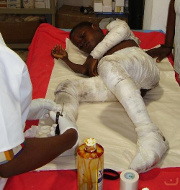Haiti (MNN) — Drought, disease, hunger, few doctors and no president. These are just a few of the issues plaguing Haiti right now.
(Photo courtesy of For Haiti with Love)
It’s not just citizens who are affected. Organizations like For Haiti with Love that work to meet people’s physical needs through Christ’s love are also facing challenges.
“We are in the emergency medical field treating burns,” For Haiti with Love’s Eva DeHart says. “There are more and more burns, and without a government, the doctors aren’t being paid. Because the doctors aren’t being paid, the national hospitals are closed, and so the burn patients are turning to us, which gives us a tremendous increase in volume in our little clinic.
“We’ve seen more than 1,000 new burn patients since the first of January. We would normally have 40 or 50 a month, so this is a tremendous change.”
Many of these issues can be traced back to Haiti’s 2010 7.0-magnitude earthquake, which killed around 200,000 people and left more than a million homeless. Already ravaged by poverty before the tragedy, Haiti has never fully recovered.
“The organizations that were entrusted with the masses of money that came in after that earthquake chose to use them in other ways other than helping Haiti, so Haiti didn’t get the designated help it should have gotten initially…. The bulk of it has been funneled to other places and used for other things,” DeHart says.
“So then they’re having flood issues, and now they have the economic issues created by the lack of government. Everything is so expensive. People can’t really afford the food. The country has been impacted by floods, which affect growing their own food, so they have to rely on imports, and they’ve got expensive imports being intercepted by a greedy non-government set of people who are sitting there in the interim trying to get rich until the government gets reestablished. So they’re victims of all sorts of different circumstances.
“Then you take the simple things, like if your doctor is not being paid by the government, then your doctor doesn’t go to work. The hospitals don’t have doctors, so the hospitals close. Government people pick up the trash. The trash is not being picked up. You have a massive population with now all of this trash stacking up around them, and so in addition to the threats of cholera and the [Zika virus] that’s going around now, you’ve got just what happens to a population when their waste material and trash accumulates around them on a daily basis.”

(Photo courtesy of For Haiti with Love)
FWHL is doing what it can to relieve physical suffering. Its primary service is the burn clinic, and it also provides food for the elderly. Though it’s not always easy, FHWL is refusing to turn anyone away.
“God’s love says you share, and we’re trusting that since God is allowing these people to turn to us in their time of distress, our medical supplies and our contributions will hold up to support that demand,” DeHart says.
“It’s a tremendous opportunity to witness to a group of people who would normally have gone to a government hospital and never encountered the Gospel or people who prayed for them or with them for their healing. So the outreach, as far as God touching people who we would not normally have the opportunity to witness to, has been great.”
Interested in how you can help serve the vulnerable in Haiti? FHWL is always in need of financial help, and by donating, you can make a great difference.

WMighty God be with Haiti always